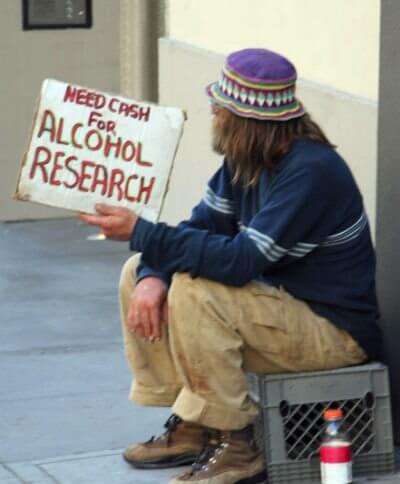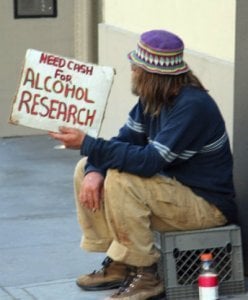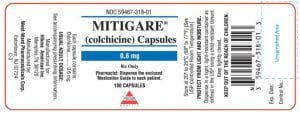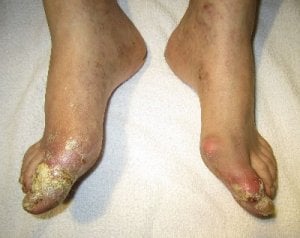Does Alcohol Affect Gout is my review of a popular statistical study about drinking alcohol and gout. Because this study is often quoted as a reason why gout sufferers should avoid alcohol. But do the numbers truly support that popular view?
In my review, I focus on an interpretation for gout sufferers. Because I believe the report conclusions are often misinterpreted. So I will try to shift the emphasis back to you, the gout sufferer. In particular, you will see why both conclusions in the report are unlikely to apply to you.
Who asks “Does alcohol affect gout?”
I wrote Does Alcohol Affect Gout for gout sufferers who are worried about their total alcohol intake. Or those who believe their gout will get better if they switch to a different type of alcohol. So this can help GoutPal Dieters and GoutPal Foodies.
Does Alcohol Affect Gout Study
Does Alcohol Affect Gout Contents
This study of over 40,000 men is often quoted to support the view that alcohol has a bad effect on gout[1]. Or that gout sufferers should switch to wine drinking because it has no effect on gout. In this review, I look if the data supports those views. Especially in the light of the author’s conclusion:
In conclusion, our prospective data indicate that alcohol intake is strongly associated with an increased risk of gout. This increased risk varies substantially according to type of alcoholic beverage: beer confers a larger risk than spirits, whereas moderate wine drinking does not increase the risk.
First, note that “prospective” here is used in its scientific sense to denote a prospective cohort. That is a group of disease-free people who are studied going forward to see if they get that disease. Then assess factors that could be related to it. So gout sufferers are specifically excluded from this study.
It is important to be aware that this is actually a study of gout-free men. Because most commentators fail to see that. So they suggest the report means that alcohol makes your gout worse. But that is not what this report claims. It merely concludes there is a link between alcohol and gout. That is definitely not the same as saying gout will stop if you avoid alcohol.
Unfortunately, this report is usually read by gout sufferers. But the report only makes sense if you view it as a gout free person. So imagine you are one of the 47,150 55-year-old men at the start of this study.
Does Alcohol Affect My Risk of Getting Gout?
In this review, I will refer to the data from the report:
| Alcohol g/day | Group Size |
Gout Cases |
Gout% | Gout-Free (from 1000*) |
| 0 (abstainer) | 11,196 | 105 | 0.9% | 991 |
| 0.1-4.9 | 11,429 | 164 | 1.4% | 986 |
| 5.0-9.9 | 6,897 | 109 | 1.6% | 984 |
| 10.0-14.9 | 6,002 | 90 | 1.5% | 985 |
| 15.0-29.9 (moderate) |
6,183 | 126 | 2.0% | 980 |
| 30.0-49.9 | 4,056 | 97 | 2.4% | 976 |
| 50 or more (heavy) |
1,387 | 39 | 2.8% | 972 |
| Total | 47,150 | 730 | 1.7% | 983 |
* Gout-Free (from 1000) is the number of people remaining gout free from 1,000 after 12 years.
In the report, statistics are adjusted for confounding factors. Also, it includes differences between beer, wine, and spirits. But I have not included the detailed analysis in order to focus on key principles.
Note how the study splits participants according to average daily alcohol intake across 7 groups. But for my review, I refer to the abstainers, moderate drinkers, and heavy drinkers. So let’s return to imagine you are starting this study. But you already know the results.
At this stage, you know you are going to be monitored for gout. But you know you’ve been tested and found to be gout free. For the sake of this review, let’s say the organizers give you a choice. Continue with your current drinking habits, or switch to a new group.
First, let’s look at the overall risk. We see that for every 1,000 men, it is normal for 983 to stay gout-free for the next 12 years. So, there’s a very good chance that you won’t get gout. But now that you are aware of the general risk, any sensible person will take steps to avoid gout. In a moment, I’ll return to the different risks according to alcohol intake. But let’s deal with the elephant in the room.
Does Alcohol Affect Uric Acid?
We know that gout should be called uric acid arthritis. Yet this report ignores uric acid levels. Except for passing references in the introduction (as hyperuricemia) and in the discussion of results and related studies. Now I understand how scientists must be thoroughly detached when investigating their claims. But in the real world, people who see they are at risk for gout will do something about it. So the first thing any sane person will do in this situation is to get a uric acid test. Because the results of that test are the best indicator of the likelihood of getting gout.
Why, oh why, is there no assessment of uric acid levels in this study?
Also, we know that drinking alcohol, like gout, is caused by a mix of genetic and environmental factors[2]. In fact, Cloniger’s words make perfect sense if we substitute alcoholism with gout
susceptibility to [alcoholism/gout] is neither entirely genetic, nor entirely environmental, nor simply the sum of separate genetic and environmental contributions. Rather, specific combinations of predisposing genetic factors and environmental stressors appear to interact before [alcoholism/gout] develops in most persons.
So in the report, we see statistics adjusted for known factors: “age, total energy intake, diuretic use, history of hypertension, history of renal failure, and intake of total meats, seafood, purine-rich vegetables, dairy foods, and fluid.” Yet the biggest known factors, uric acid levels, and family gout history are ignored!
My view is that it is a non-gout study. Therefore, it is irrelevant to gout sufferers.
How Alcohol Affects Gout-free People
Let’s continue with the comparison of risks of not becoming gout sufferers. Because we’re encouraged to see that reducing alcohol intake improves our chance of avoiding gout. So how much improvement is likely?
We know it is normal for 17 of every thousand of us to become gout sufferers. But in this study we can’t monitor uric acid to see who that will be. Also, the scientists have told us to ignore gout in our brothers, fathers, uncles, and granddads. So should we change our drinking habits?
In theory, everyone will want to become abstainers. Because then it is normal for only 9 people to become gout sufferers in 12 years. Heavy drinkers have the most to gain. Because that group can expect 19 more people to stay gout-free by stopping drinking. Or can they?
Unfortunately, by omitting uric acid testing and family gout history, we do not know enough about the heavy drinkers in this study. Because it is likely that they had a higher starting uric acid. Also, it is likely that they had a genetic disposition to gout. But we will never know.
Does Changing Alcohol Type Affect Gout?
The secondary claim from this study is that beer is worse than spirits for gout risk. But wine has no effect on risks of becoming a gout sufferer.
Again, this is statistically true if you compare a normal beer drinker with a normal spirit drinker and with a normal wine drinker. But the detailed analysis reveals a far more important truth.
Because the investigation looks at various factors as I described above. Then the details show that within every sub-group, some people have increased risk and some have decreased risk. That individual reaction applies to both the amount of alcohol consumed and its type. So in the real world, you must ignore group averages and act according to your own body.
Does Alcohol Affect Gout Summary
- The report proves that statistically, alcohol does increase your overall risk of becoming a gout sufferer. Because the normal rate of gout drops from 1.7% to 0.9% when you take away alcohol.
- But within sub-groups alcohol can reduce the risk of getting gout for some people. Others have higher risks than normal people within the group. This report cannot identify how individual people are affected by alcohol.
- Once participants in this study got gout, they were excluded. But it would have been better to continue monitoring. Especially where gout encouraged people to reduce alcohol intake. Then we would see if the effects of alcohol on gout are reversible.
- The risks are so small that scientists had to consider over 40,000 men for 12 years to get enough data to find significant differences between alcohol drinkers and abstainers.
- The study should have done more preparation to assess risks of gout in the participants. Especially by including uric acid blood test results and family connections to gout sufferers.
- If you are already a gout sufferer, the report is irrelevant.

Does Alcohol Affect Your Gout
The important takehome message from this report is that alcohol can affect gout. But only for 8 people in every 1,000. More importantly, this is an average. So for some people, alcohol increases your chance of being a gout sufferer. But for others, alcohol reduces your chance of being a gout sufferer. So you have to test how alcohol affects your uric acid levels. Which you can only do when you measure alcohol intake as part of a balanced diet with regular uric acid monitoring.
Finally, there is no evidence here that changing alcohol consumption affects you if you already have gout. But I will be reviewing other gout studies in this series to assess what gout sufferers might do to improve their treatment plan with alcohol.
In the meantime, if you need personal help with drinking alcohol and gout, you should ask in the gout forum.
To get an email when I publish more research about drinking alcohol and gout, subscribe to my free update service:
Leave Does Alcohol Affect Gout to see more studies about drinking alcohol and gout.
Does Alcohol Affect Gout Related Topics
Please remember: to find more related pages that are relevant to you, use the search box near the top of every page.
Common Terms: alcohol, beer, Most Helpful Gout Pages
Other posts that include these terms:
- High Alkaline Foods for Gout Diet Menu
- Gout Foods Table for Vegetables
- Gout Food List for GoutPal Foodies
- Foods High in Uric Acid Chart
- Purine Rich Foods
- Colchicine For Gout
- What Foods Cause Gout?
Does Alcohol Affect Gout References
- Choi, Hyon K., Karen Atkinson, Elizabeth W. Karlson, Walter Willett, and Gary Curhan. “Alcohol intake and risk of incident gout in men: a prospective study.” The Lancet 363, no. 9417 (2004): 1277-1281. Drinking Alcohol & Gout PDF.
- Cloninger, C. Robert, Michael Bohman, and Sören Sigvardsson. “Inheritance of alcohol abuse: Cross-fostering analysis of adopted men.” Archives of general psychiatry 38, no. 8 (1981): 861-868.
Please give your feedback
Did this page help you? If yes, please consider a small donation. Your donations help keep GoutPal's gout support services free for everyone.
If not, please tell me how I can improve it to help you more.
- YouTube
- The gout forums.
TL;DR - Does Alcohol Affect Gout?
This information is most useful to GoutPal Foodies and Dieters.
Key points to remember about Does Alcohol Affect Gout are:
- Alcohol does affect the risk of getting gout. But overall risks are very small.
- Individuals with groups can have reduced risk or increased risk from alcohol intake.
- The report is irrelevant to existing gout sufferers.
Need more help? Then get personal gout diet help from GoutPal.
But, some are worse while others are better.








